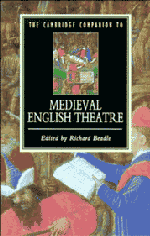Book contents
- Frontmatter
- 1 An introduction to medieval English theatre
- 2 The theatricality of medieval English plays
- 3 The York cycle
- 4 The Chester cycle
- 5 The Towneley cycle
- 6 The N-Town plays
- 7 The non-cycle plays and the East Anglian tradition
- 8 The Cornish medieval drama
- 9 Morality plays
- 10 Saints' plays
- 11 Modern productions of medieval English plays
- 12 A guide to criticism of medieval English theatre
- Select bibliography
- Continued Series List
- Index
8 - The Cornish medieval drama
Published online by Cambridge University Press: 28 May 2006
- Frontmatter
- 1 An introduction to medieval English theatre
- 2 The theatricality of medieval English plays
- 3 The York cycle
- 4 The Chester cycle
- 5 The Towneley cycle
- 6 The N-Town plays
- 7 The non-cycle plays and the East Anglian tradition
- 8 The Cornish medieval drama
- 9 Morality plays
- 10 Saints' plays
- 11 Modern productions of medieval English plays
- 12 A guide to criticism of medieval English theatre
- Select bibliography
- Continued Series List
- Index
Summary
The earliest surviving dramatic use of Cornish is part of what may or may not be a play written on the back of a charter dated 1340, and the last is a single line in Richard Brome's The Northern Lasse, printed in 1632. The latter need not delay us; the somewhat garbled Cornish is used simply as something foreign. The former, however, has been seen as evidence for early secular drama in Cornwall and in England. In forty-one lines of rhymed strophic verse similar to that of later plays, a speaker offers a young lady to someone as a wife, and then the girl herself is given some advice on handling a husband: agree to his wishes without any intention of carrying them out. It has been suggested that the Charter Fragment represents the bawd's part in a comedy, but there is too little of it for any certainty, and even the inclusion of a Cornish place-name is not particularly helpful. There is evidence for the performance of genuinely secular plays (most notably of Robin Hood) in Cornwall, but texts have not survived and what language they were performed in is unclear.
- Type
- Chapter
- Information
- The Cambridge Companion to Medieval English Theatre , pp. 211 - 239Publisher: Cambridge University PressPrint publication year: 1994
- 1
- Cited by

